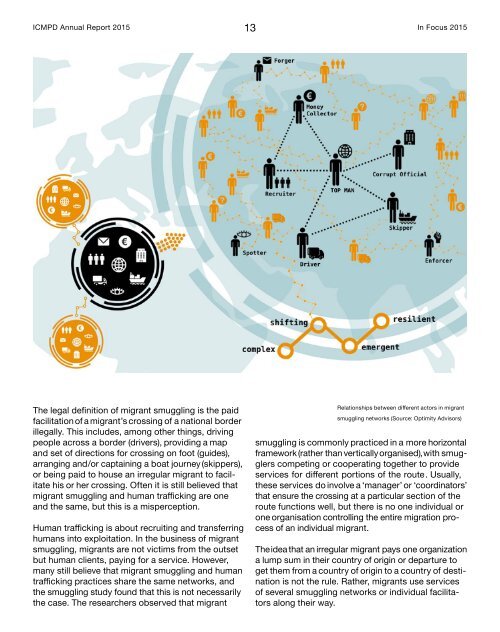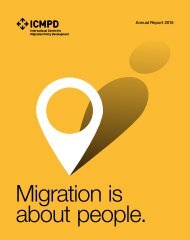ICMPD-Review-2015
You also want an ePaper? Increase the reach of your titles
YUMPU automatically turns print PDFs into web optimized ePapers that Google loves.
<strong>ICMPD</strong> Annual Report <strong>2015</strong><br />
13<br />
In Focus <strong>2015</strong><br />
The legal definition of migrant smuggling is the paid<br />
facilitation of a migrant’s crossing of a national bor der<br />
illegally. This includes, among other things, driving<br />
people across a border (drivers), providing a map<br />
and set of directions for crossing on foot (guides),<br />
arrang ing and/or captaining a boat journey (skippers),<br />
or being paid to house an irregular migrant to facilitate<br />
his or her crossing. Often it is still believed that<br />
migrant smuggling and human trafficking are one<br />
and the same, but this is a misperception.<br />
Human trafficking is about recruiting and transferring<br />
humans into exploitation. In the business of migrant<br />
smuggling, migrants are not victims from the outset<br />
but human clients, paying for a service. However,<br />
many still believe that migrant smuggling and human<br />
trafficking practices share the same networks, and<br />
the smuggling study found that this is not necessarily<br />
the case. The researchers observed that migrant<br />
Relationships between different actors in migrant<br />
smuggling networks (Source: Optimity Advisors)<br />
smuggling is commonly practiced in a more horizontal<br />
framework (rather than vertically organised), with smugglers<br />
competing or cooperating together to provide<br />
services for different portions of the route. Usually,<br />
these services do involve a ‘manager’ or ‘coordi na tors’<br />
that ensure the crossing at a particular section of the<br />
route functions well, but there is no one individual or<br />
one organisation controlling the entire migration process<br />
of an individual migrant.<br />
The idea that an irregular migrant pays one organization<br />
a lump sum in their country of origin or departure to<br />
get them from a country of origin to a country of des tination<br />
is not the rule. Rather, migrants use services<br />
of several smuggling networks or individual facil itators<br />
along their way.
















